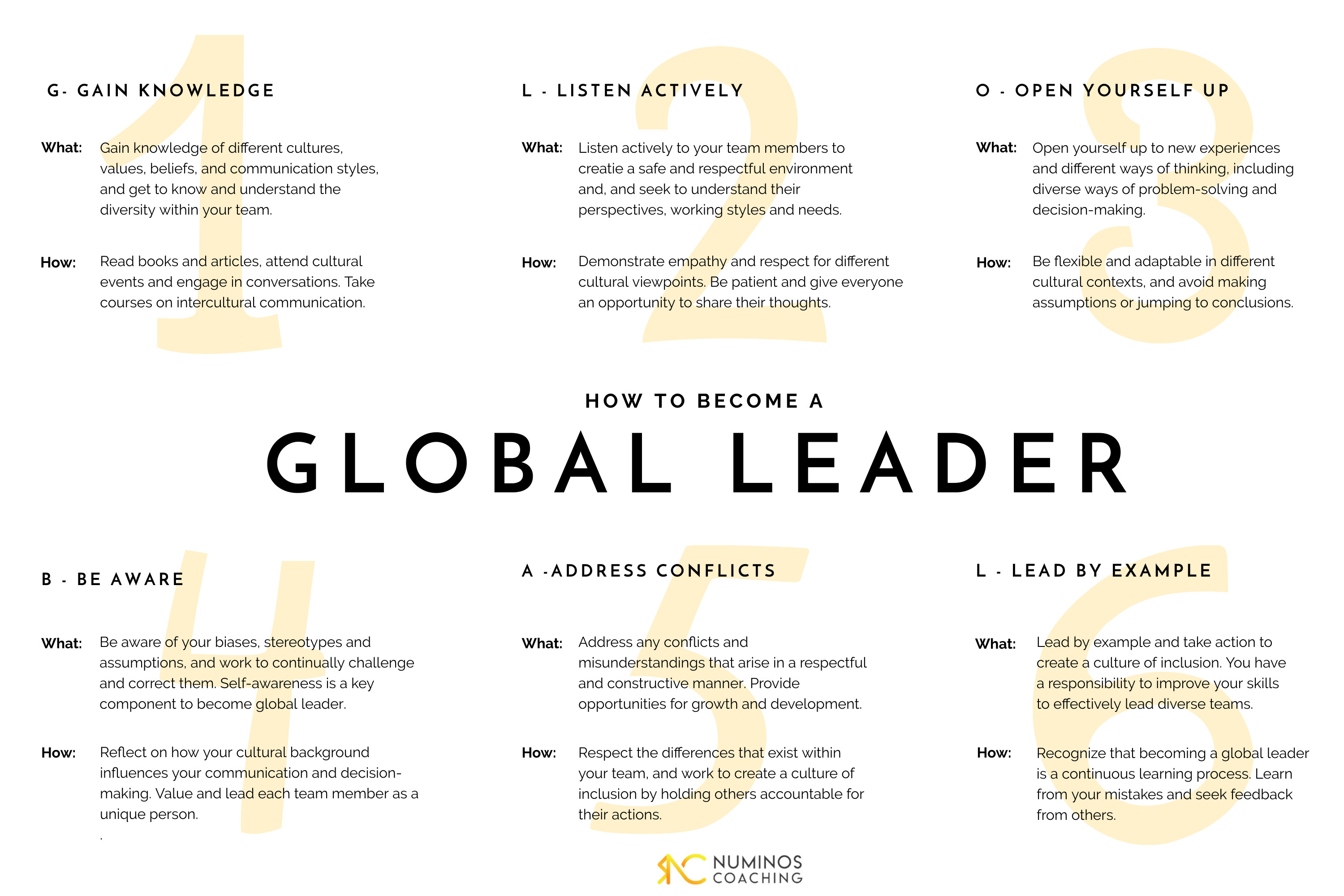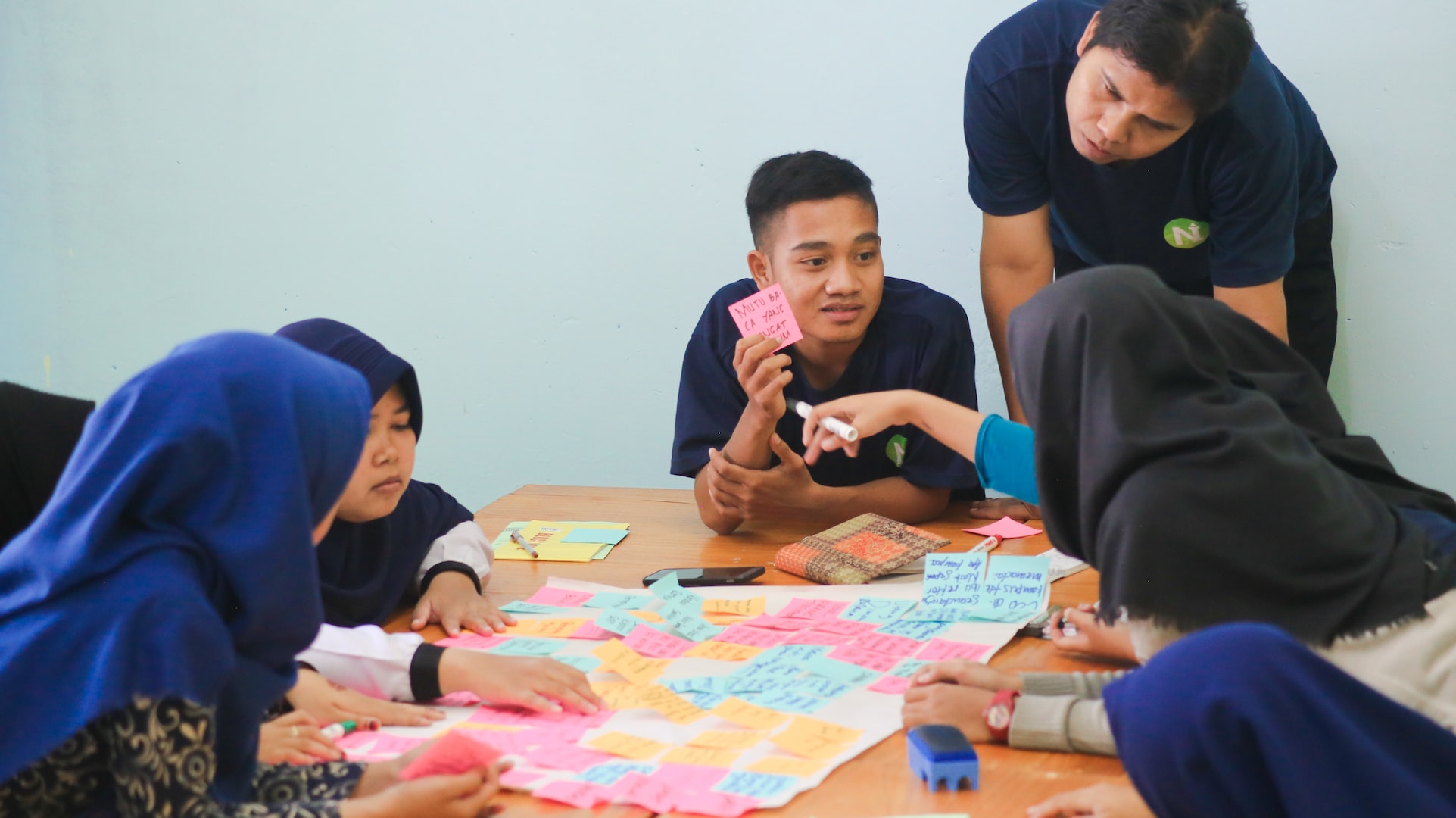Share
How to Lead Across Cultures: 6 Steps of Becoming a Global Leader
Have you ever thought about what it takes to become a global leader? Well, it's not just about having international experience and knowledge. It's also about developing soft skills that will enable you to work effectively with people from diverse cultures, backgrounds, and experiences. In this blog post, we'll explore six steps that will help you to master global leadership.
What Is Global Leadership?
Global leadership is a term used to describe the ability to lead teams across different cultures, languages, and borders. It's more than just a skill set or a set of leadership competencies. It's about understanding and embracing cultural differences and being able to lead a team that includes people from different backgrounds.
Global leadership is important in today's world because of the increasing diversity of the workforce and the globalization of business. Investing in leadership development enables companies to navigate cross-cultural challenges and be more successful in the global market. That's why at Numinos Coaching we also offer specifically designed cross-cultural trainings for Mexico.
With the rise of remote work and virtual teams, global leadership is becoming one of the most important leadership topics. Now more than ever, leaders must know how to navigate cross-cultural communication and collaboration without the benefit of face-to-face interaction.
What Are the Steps of Becoming a Global Leader?
To be a strong leader, you must cultivate soft skills that allow you to collaborate effectively with people of varying cultures, backgrounds, and experiences. This blog post outlines 5 crucial steps to becoming a global leader: learn about diverse cultures, actively listen to team members, embrace new experiences, acknowledge your biases and resolve conflicts constructively, and lead by example.
Becoming a global leader means that you have to change your mindset and approach to leadership. It is about leveraging your international life experiences and harnessing a different leadership style.
G - Gain Knowledge
To become a global leader, you need to understand the different cultures, values, beliefs, and communication styles of your team members. You can do this by attending cultural events, reading books and articles, and engaging in conversations.
Taking courses on intercultural communication can also be helpful in learning about different cultural norms and practices. By doing this, you can communicate better with your team members and understand their perspectives, while increasing your cultural sensitivity.
You can learn more about why cultural training is important in this blog post.
L - Listen Actively
Listening actively to your team members is crucial to creating a safe and respectful environment. You need to understand their working styles, perspectives, and needs.
Active listening involves more than simply hearing what someone says; it requires an effort to understand their perspective and show respect for their opinions. Cultural sensitivity encompasses recognizing and respecting cultural differences, including values, norms, customs, beliefs, and practices that may differ from our own.
Showing empathy and respect for different cultural viewpoints can go a long way in building trust and improving communication with your team members.
O - Open Yourself Up
Being open to new experiences and different ways of thinking is essential for becoming a global leader. You need to be adaptable in different cultural contexts and avoid making assumptions or jumping to conclusions.
It is essential to have a flexible leadership style that can adapt to the diverse needs of each team member. This means being willing to open up and jump into different leadership roles, depending on the personality and communication style of each individual.
As a global leader, you must recognize that each team member is unique, with their own strengths, weaknesses, goals, and motivations. For example, some team members may require more hands-on guidance and instruction, while others may prefer a more hands-off approach and greater autonomy.
By being able to adapt to these different leadership roles, a global leader can build a stronger bond with each team member. Being open-minded will help you learn from different cultural perspectives and improve your problem-solving and decision-making skills.
B - Be Aware
Self-awareness is an essential component of becoming a global leader. You need to be aware of your biases, stereotypes, and assumptions and work to challenge and correct them continually.
Our biases can stem from a range of factors, including our upbringing, culture, experiences, and personal beliefs. When left unchecked, these biases can influence the way we perceive information, make decisions, and interact with others.
Reflecting on how your cultural background influences your communication and decision-making is crucial. A self-aware global leader who challenges their biases can be more effective and transformative.
Read more about how your train is trying to trick when communicating across cultures.
L - Lead by Example
As a global leader, you have a responsibility to create a culture of inclusion. Leading by example and taking action to create a culture of inclusion is essential.
Recognize that becoming a global leader is a continuous learning process and increasing your leadership capacity on a daily basis is essential.
You should learn from your mistakes and seek feedback from others to improve your skills to lead diverse teams. By leading by example, you can inspire your team members to embrace diversity and become more inclusive in today's more complex environments.
Why Are All the Five Steps Important in Becoming a Global Leader?
Forgetting even one of the steps to becoming a global leader can have some serious consequences. Let me break it down for you. A leader who overlooks diverse cultures and values can, unknowingly, harm team members or make wrong decisions affecting team dynamics. Trust me, you don't want that kind of negative energy in your team. In this blog post I have shared three common mistakes that leaders often make when managing Mexican teams.
If a leader at a global level refrains from listening to their teammates, they risk ignoring valuable perspectives and ideas that could enhance the team's success. If someone is resistant to new ideas and ways of thinking, they may have difficulty collaborating with team members from diverse cultural backgrounds, which could result in misunderstandings or conflicts.
It's also crucial for a global leader to address conflicts and misunderstandings in a respectful and constructive manner. Failure to do so can create a toxic work environment, which is no good for anyone. Lastly, leading by example and taking action to create a culture of inclusion is vital for a global leader. Doing so can help retain diverse talent and unlock your team's potential for growth and success.
Forgetting steps to become a global leader can impair your ability to lead a diverse team and establish a positive work environment. So let's prioritize developing these soft skills and continuously work to improve them.
Becoming a global leader requires developing soft skills such as active listening, self-awareness, and cultural competence. Follow these five steps to improve your skill of working with individuals from diverse backgrounds, enhancing communication, and promoting an inclusive culture within your team.
Want to deep dive into becoming a global leader? During the 8-week online program, we will work with you to enhance your ability to lead with inclusivity and empathy, deepen your understanding of cultural differences, and develop your communication skills.
We will help you identify your strengths and areas for growth, and provide you with actionable strategies to improve your communication, collaboration, and leadership skills.
Tanja is a Certified Intercultural Communication Coach and Positive Psychology Practitioner. With a Master's Degree in Business Administration, specializing in Leadership and People Management, she helps companies and supports expats and multicultura team leaders in comprehending cultural dimensions and leveraging existing cultural differences to create powerful organizational strengths.
About the Author
Related Articles
Company
Good to know
Stay up to date on the latest news and expand your horizons!
©2024 Numinos Ltd | Intercultural Communication Training | Finland & Mexico



